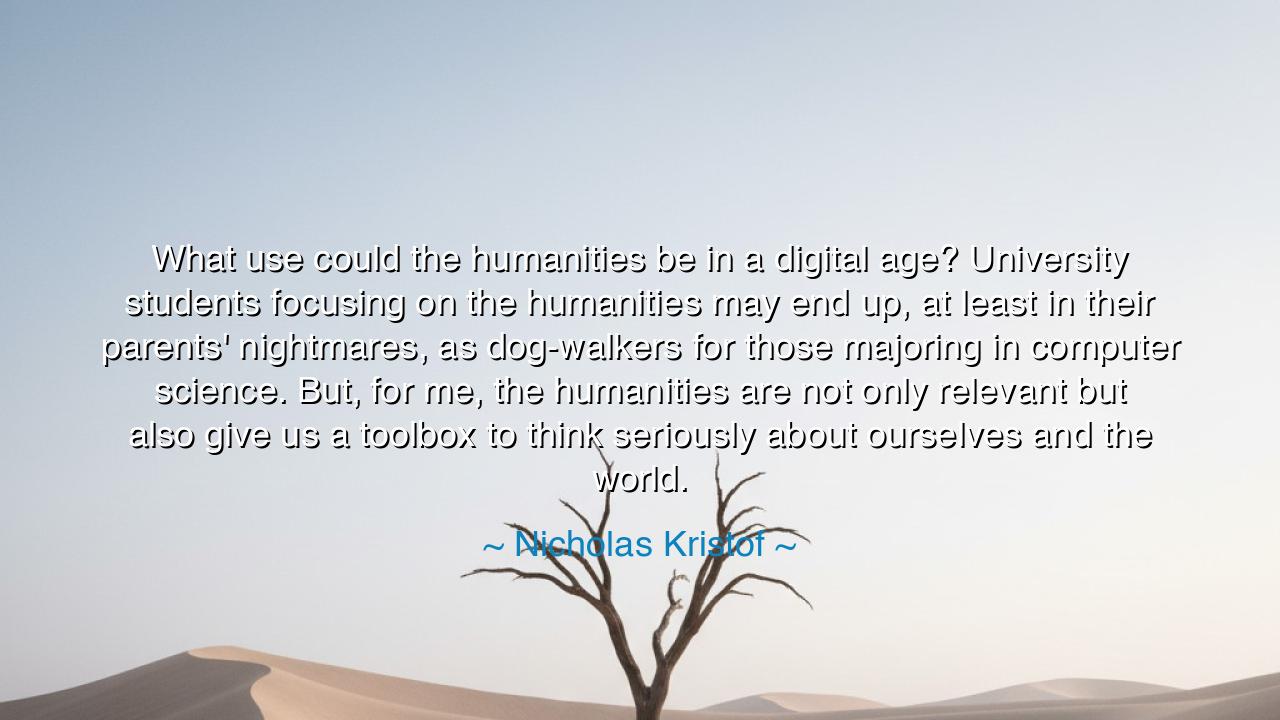
What use could the humanities be in a digital age? University
What use could the humanities be in a digital age? University students focusing on the humanities may end up, at least in their parents' nightmares, as dog-walkers for those majoring in computer science. But, for me, the humanities are not only relevant but also give us a toolbox to think seriously about ourselves and the world.






"What use could the humanities be in a digital age? University students focusing on the humanities may end up, at least in their parents' nightmares, as dog-walkers for those majoring in computer science. But, for me, the humanities are not only relevant but also give us a toolbox to think seriously about ourselves and the world." — thus spoke Nicholas Kristof, the journalist and truth-seeker who has long wandered the crossroads of humanity, politics, and conscience. His words rise as both a defense and a declaration — a shield for the humanities in an era that worships machines. With humility and wit, he reminds us that though the digital age has given us power over data, it has not yet taught us the wisdom to wield it well. For knowledge without understanding is a sword in the hands of a child.
In the manner of the ancients, one might say: a people who know how to build a world but not why will soon build their own ruin. Kristof’s quote speaks to this truth. The humanities — philosophy, history, literature, art, and language — are not relics of a gentler time, but the heartbeat of civilization itself. In the cold precision of algorithms and code, we risk losing sight of the human questions that give meaning to our progress: Who are we? What is right? What is beauty? What is truth? Without these, technology becomes mere motion — powerful, but blind. The toolbox of the humanities, as Kristof calls it, equips us not with gadgets, but with insight: the ability to think, to empathize, to see beyond the numbers into the soul.
In this age where the hum of machines drowns the whisper of thought, Kristof’s wisdom sounds like an ancient bell. For even as artificial intelligence grows more cunning, it cannot dream. It cannot suffer. It cannot love. Only the human being — shaped by story, by art, by moral reflection — can give meaning to the tools he creates. The humanities, therefore, are not a luxury, but a safeguard — they keep us human in a world that would make us gods. Without them, we risk building wonders and losing wonder itself.
Consider the tale of Leonardo da Vinci, the great bridge between art and science. He dissected the body not merely to measure it, but to understand the miracle of its form. His machines were born not of greed, but of curiosity. His art — the Mona Lisa, the Vitruvian Man — was not an escape from science, but its completion. Leonardo was both engineer and poet, inventor and philosopher — a man who proved that the pursuit of progress and the pursuit of meaning need not be divided. This, too, is the essence of Kristof’s argument: that the future belongs not to those who master one discipline, but to those who unite technology and humanity, reason and heart.
The nightmare of the parents, as Kristof wryly observes, is that their child who studies literature will serve the one who studies machines. Yet he reminds us that this is an illusion born of fear. The student of code may build the tool, but the student of humanity teaches us how it should be used. The humanist shapes the moral compass of the age, reminding the world that progress without purpose is emptiness. Every great movement — from democracy to human rights — began not with data, but with the imagination of the human spirit. For it is through story and philosophy that we learn to see one another not as instruments, but as souls.
The lesson, then, is this: do not measure the worth of knowledge by its profit, but by its power to deepen life. The study of the humanities is not the study of the past — it is the study of what makes us endure. As the machines rise to count, we must rise to understand. Let every student of art, history, and philosophy stand tall, knowing they carry not the tools of industry, but the tools of civilization. The mind trained in empathy, imagination, and ethics is the true engine of the future.
And so, my child, remember the wisdom of Nicholas Kristof: the world will always hunger for those who can think seriously about themselves and the world. Learn the sciences, yes — but let the humanities teach you how to be human. Let the digital age race forward; you, walk with purpose. For when the noise of innovation fades, it is the human voice — the poet, the philosopher, the teacher — that remains. Guard that voice, nurture it, and let it remind you that though machines may calculate our lives, only the humanities can illuminate them.






AAdministratorAdministrator
Welcome, honored guests. Please leave a comment, we will respond soon